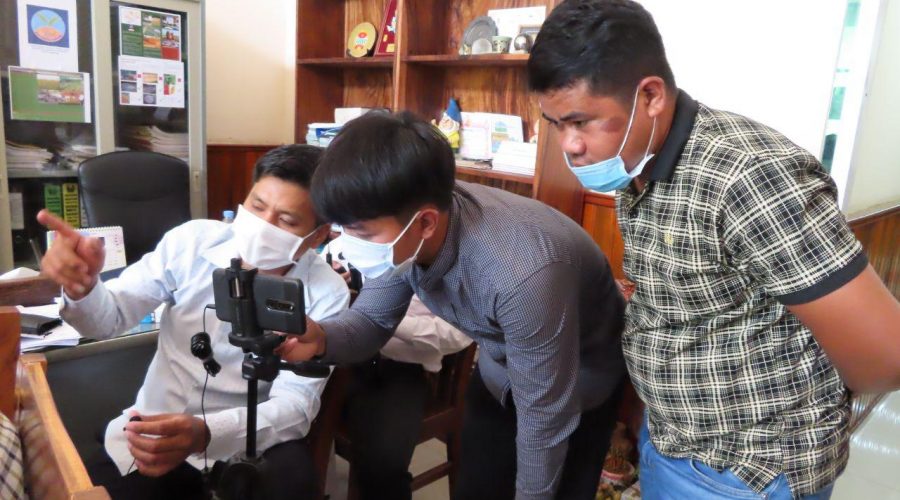
DIGITALIZATION HELPS IMPROVE AGRICULTURAL PRODUCTION TO MINIMIZE MARKET GAP!
Since February 2020 till June 2022 and recent year 2023 the world was facing the most difficult situation in which it is required to find a new thinking pathway to tackle the issues in particular in person meetings and events which it is sometimes replaced by digitalized means, therefore capacity building on digitalization is key to unlock the barriers of various communications include meetings, enterprising produces to markets and trainings.
Since then, digitalization plays key roles to connect amongst stakeholders through various digital means. Up to date, digitalization is more and more important not only for digital meetings, enterprising produces to markets and trainings, but also for accelerating and promoting of all types of development in the current and future context everywhere. Further, digitalization can also minimize gap amongst the stakeholders even if there will be future travel restrictions such as experiences in the Covid-19 in 2020, 2022 and even in recent year 2023. It helps improving the – capacity of production, management and leadership at all levels. CFAP Cambodia provides the training course on training of trainer (ToT) for members’ organizations through online training courses to ensure that members get access to capacity building when the world encounters the same experiences in the future, it will not affect seriously for farming businesses as before.
Digital communication skills, agricultural production capacity of smallholders and markets for smallholders in rural Cambodia will be connected closely through digitalization. Covid-19 has put more pressure on smallholders, family farmers, sub(national) farmers’ organizations and agricultural cooperatives everywhere in Cambodia, especially the rural communities.
Farmers could not get access to information on time, limited communication, limited technology, lack of capacity building/training, less meetings and limited supplying volume of farmers’ produces to markets and or big buyers. There were many contract agreements between farmers’ organizations, producers’ associations and agricultural cooperatives and big companies were not applied correctly collectively for sales and purchases as planned and caused big problems for smallholders in rural Cambodia to sell their products to markets. Unfair completion of agricultural products between local and imported products created another pressure additionally to the effects of climate change to smallholders and leading to be in chronic debt and facing loss of their farmlands and shelters accordingly after Covid-19. Because it was new experiences when Covid-19 was breaking outs in February 2020, agricultural production has been decreased accordingly, therefore market demands have also reduced since then till 2023 which created market difficulties for farmers and farmers’ organizations and agricultural cooperatives. Farmers sometimes cut trees down such as cashew, pepper, mango, lemon and some other crops to grow crops that they are popular on markets and when they faced problems with markets again farmers cut new trees down again and grow new trees accordingly. The problems happen almost every year, especially smallholders who have limited capital without proper policy support.
CFAP in collaboration with development partners and members’ organizations finds a solution to tackle problems faced by smallholders and members’ organizations at sub(national) level by providing various training courses through in person and online session on ToT on business planning, short video producing, business plan development, marketing planning, business management and agricultural technical skills during the Covid-19 to strengthen the capacity of farmers and members’ organizations (producers’ associations and agricultural cooperatives) to prevent them from serious effects caused by the pandemic and climate change impacts, thus to enable them to continue working on farms to supply markets as per contract agreement between farmers and big buyers.
After providing various training courses online, we could learn that farmers, farmers’ organizations and agricultural cooperatives have proper capacity to improve their agricultural production by using technology and digitalization to helps enabling their produces to markets, therefore the gap between farmers, farmers’ organizations and agricultural cooperatives and big companies have minimized gradually.
Farmers, farmers’ organizations and agricultural cooperatives appreciated the digital training programs that can help to tackle their issues when they face problems like Covid-19 and climate change. However, farmers have problems with the uses of digitalization as they do not have – background on digitalization, further smallholders also faced problems on language issues and they cannot get access to a better internet service as well in most rural areas. There were 17 members’ organizations and agricultural cooperatives amongst the 32 members’ organizations in 15 provinces participated in training courses on short video producing, business planning, PGS trainings and uses of digitalization through digitalization such as google meet and zoom tools. Base on the successful stories and learning from the fields, CFAP will use experiences to share knowledge to other members since 2020 till present and also in the future to find a way to ensure that the rural communities can get access to digitalization and technology.
Due limited capacity of young and women farmers and leaders of members’ organizations on uses of the digitalization, based on our experiences we need to build the capacity for participants first “pre-training session”, to ensure that participants can understand better on uses of digitalization and digital tools before the real training course happen.
If it is unclear, therefore conduction the training needed assessment (TNA) is required to ensure the training course is consistent to the capacity of the young participants and there is no big knowledge gap amongst the trainees. However, it is required specific training on using tools to create platforms of the events/meetings.
In conclusion digitalization is key to unlock the barriers of Covid-19, travel restrictions, enterprising of farmers’ produces to markets, meetings, trainings, resiliency to climate change and engaging practices of smallholder farmers into policy support in particular youth in agriculture. Digitalization can engage farmers from practices into policy support in Cambodia under the 4.0 industry to boost rural economy after Covid-19 and beyond that can help to expand opportunity for agricultural upgrading and equitable development.